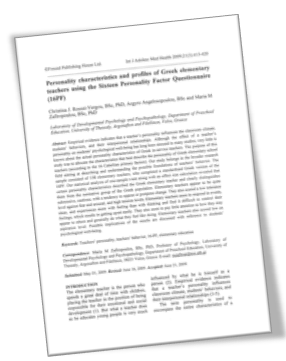ΠΟΙΑ ΕΙΝΑΙ ΤΑ ΧΑΡΑΚΤΗΡΙΣΤΙΚΑ ΤΗΣ ΠΡΟΣΩΠΙΚΟΤΗΤΑΣ ΤΩΝ ΕΛΛΗΝΩΝ ΕΚΠΑΙΔΕΥΤΙΚΩΝ;

Personality characteristics and profiles of Greek elementary teachers using the Sixteen Personality Factor Questionnaire (16PF).
Roussi Christina, Angelosopoulou Argiroula & Zafiropoulou Maria
University of Thessaly
Roussi Christina, Angelosopoulou Argiroula & Zafiropoulou Maria
University of Thessaly
ABSTRACT
Empirical evidence indicates that a teacher's personality influences the classroom climate, students' behaviors, and their interpersonal relationships. Although the effect of a teacher's personality on students' psychological well-being has long been stressed in many studies, very little is known about the actual personality characteristics of Greek in-service teachers. The purpose of this study was to allocate the characteristics that best describe the personality of Greek elementary school teachers (according to the 16 Cattellian primary factors). Our study belongs in the broader research field aiming at describing and understanding the possible foundations of teachers' behavior. The sample consisted of 138 elementary teachers, who completed a standardized Greek version of the 16PF. Our statistical analysis of one-sample t-test along with an effect size calculation revealed that certain personality characteristics described the Greek elementary teacher and clearly distinguishes them from the normative group of the Greek population. Elementary teachers appear to be quite submissive, cautious, with a tendency to oppose or postpone change. They also scored a low tolerance level against fear and arousal, and high tension levels. Elementary teachers seem to respond to events, ideas, and experiences more with feeling than with thinking and find it difficult to control their feelings, which results in getting upset easily. They also seem to pay little attention to how they may appear to others and generally do what they feel like doing. Elementary teachers also scored low on aspiration level. Possible implications of the results are discussed with reference to students' psychological well-being.
Empirical evidence indicates that a teacher's personality influences the classroom climate, students' behaviors, and their interpersonal relationships. Although the effect of a teacher's personality on students' psychological well-being has long been stressed in many studies, very little is known about the actual personality characteristics of Greek in-service teachers. The purpose of this study was to allocate the characteristics that best describe the personality of Greek elementary school teachers (according to the 16 Cattellian primary factors). Our study belongs in the broader research field aiming at describing and understanding the possible foundations of teachers' behavior. The sample consisted of 138 elementary teachers, who completed a standardized Greek version of the 16PF. Our statistical analysis of one-sample t-test along with an effect size calculation revealed that certain personality characteristics described the Greek elementary teacher and clearly distinguishes them from the normative group of the Greek population. Elementary teachers appear to be quite submissive, cautious, with a tendency to oppose or postpone change. They also scored a low tolerance level against fear and arousal, and high tension levels. Elementary teachers seem to respond to events, ideas, and experiences more with feeling than with thinking and find it difficult to control their feelings, which results in getting upset easily. They also seem to pay little attention to how they may appear to others and generally do what they feel like doing. Elementary teachers also scored low on aspiration level. Possible implications of the results are discussed with reference to students' psychological well-being.


ΔΗΜΟΣΙΕΥΜΕΝΟ ΣΤΟ ΔΙΕΘΝΕΣ ΕΠΙΣΤΗΜΟΝΙΚΟ ΠΕΡΙΟΔΙΚΟ
INTERNATIONAL JOYRNAL OF ADOLESCENT MEDICAL HEALTH,
2009, 21 (3): 413-20.
INTERNATIONAL JOYRNAL OF ADOLESCENT MEDICAL HEALTH,
2009, 21 (3): 413-20.


